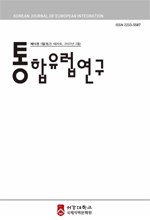이 글은 1970년대와 1980년대 유럽통합 과정에서 프랑스와 독일 양국 협력의 중요성을 설명하는 목표를 가지고 있다. 이를 위해 이 글은 1960년대 유럽통합의 정체현상이 극복되는 출발지점인 1969년 12월 헤이그 정상회담부터 1986년 유럽단일의정서(SEA) 체결에 이르는 시기까지 프랑스와 독일이 어떻게 유럽통합을 견인하는 양축이 되었는가를 설명하고 있다. II장에서는 1969년 헤이그 정상회담부터 1974년 파리 정상회담까지 유럽통합에서 독·프 협력의 중요한 국면들이 기술될 것이다. III장과 IV장에서는 1979년 유럽통화제도(EMS) 수립 과정과 1980년대 초반 영국 분담금 문제 해결 과정에서 독·프 양축의 유럽통합에서의 지도적 역할을 설명할 것이다.
This article aims to explain the importance of French-German cooperation in the process of European integration in the 1970s and 1980s. To this end, this article explains how France and Germany became both pillars of European integration from the December 1969 Hague Summit, the starting point for overcoming the stagnation of European integration in the 1960s, to the signing of the European Single Act in 1986. Chapter II will describe important aspects of French-German cooperation in European integration from the Hague Summit in 1969 to the Paris Summit in 1974. Chapters III and IV will explain the leading role of French-German bilateral ties in European integration in the process of establishing the European Monetary System in 1979 and solving the British Budgetary Question in the early 1980s.
Ⅰ. 서론
Ⅱ. 헤이그 정상회담에서 유럽이사회의 출범까지
Ⅲ. 유럽통화제도(EMS)의 수립
Ⅳ. 영국 분담금 문제의 해결
Ⅴ. 결론
(0)
(0)
